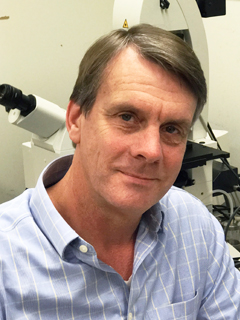HOW CAN WE HELP YOU? Call 1-800-TRY-CHOP
Anderson Laboratory
The Anderson Lab’s main research focus is schizophrenia in the context of a genetic mutation, 22q11.2 deletion syndrome (22q11DS). Mitochondrial function influences schizophrenia risk in 22q11DS such that stem cell-derived neurons from individuals with 22q11DS without schizophrenia show elevated expression of mitochondrial genes relative to both healthy controls and to people with 22q11DS with schizophrenia. The lab's researchers are keenly interested in understanding mechanisms underlying this mitochondrial compensation, since it could lead to novel schizophrenia treatment or prevention strategies. This work also aims to understand why mitochondrial dysfunction increases schizophrenia risk in 22q11DS, which could lead to new interventional approaches.
Key collaborators include Douglas Coulter, PhD, Donna McDonald-McGinn, MD, CGC, Raquel Gur, MD, PhD, Jorge Alvarez, BSc, PhD, and Douglas Wallace, PhD. Funding for this work comes from the National Institute of Mental Health and the Lisa Dean Moseley Foundation.
A second focus of the Anderson Lab's research is the study of epilepsy and autism, two frequently devastating illnesses that often co-occur. This focus includes studies of transgenic animal model with a Dravet syndrome mutation in collaboration with Ethan Goldberg, MD, PhD. Investigators work with neonatal transplants of stem cell-derived inhibitory interneurons to correct circuit pathology and abnormal social behaviors in these models. These studies could lead to improved understanding of brain circuits that differentially influence epilepsy and autism, and to cell-based therapy. The Eagles Autism Foundation funds this work.
This project involves human stem cell-derived inhibitory interneurons, also being examined in collaboration with Thomas DeRaedt, PhD to develop a novel treatment for brain tumors. This work is funded by the Department of Defense.
Kelly Jordan-Sciutto, PhD, collaborates with lab investigators culture human microglia, neurons, and astrocytes for the study of brain effects of HIV and antiretroviral treatments. The National Institute on Drug Abuse Funds this work.


Stewart A. Anderson, MD
Director of Research, Department of Child and Adolescent Psychiatry and Behavioral Services
Dr. Anderson’s research interests focus on the molecular and cellular mechanisms that govern the development of the mammalian forebrain. In his research on the development of the cerebral cortex, he is particularly interested in understanding the molecular underpinnings behind the fate determination and axon targeting of subclasses of GABAergic interneurons implicated in the neuropathology of schizophrenia.